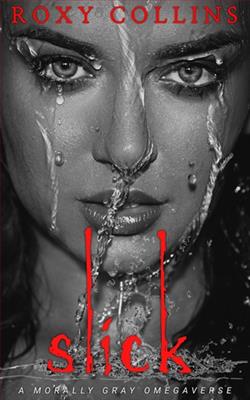
Slick
by Roxy Collins
They stole my slick and kept me from my mate…
From the moment I was sold to The Serenity Center at sixteen, I ceased to be a person.
They not only erased my memories, but they also reduced me to a single purpose: the manufacture of omega secretions, known as slick.
To the facility owners I’m just a juicy line on their spreadsheets, and to the collectors who milk me for all I’m worth, I’m just a job. Because there are powerful, wealthy people who will pay a lot of money to have exclusive rights to my slick.
I lived in ignorance of this betrayal for a decade, sold on a dream of one day retiring with my perfect mate.
Until they bring in a specimen – a real, live alpha – to tempt a record deposit out of me.
Not only does he bust through a wall to get to me, but he breaks me out, taking my beta caretaker with us. This should be the start of our perfect life together, but we’re barely free of the facility before we’re torn apart.
Now I’m alone in a world I’ve forgotten.
Until I meet the men who smell and taste as good as my alpha.
Maybe this is the real dream – a pack of my own – if we could just stay alive long enough for them to claim me.
.
Read
Slick on http://kissnovel.net
Martial Peak Reviews
Roxy Collins' Slick is a compelling dive into a dystopian world where human autonomy is stripped away in favor of corporate greed and biological exploitation. The novel's premise is both intriguing and unsettling, drawing readers into a narrative that explores themes of identity, freedom, and the primal connections between individuals.
At the heart of Slick is the protagonist's journey from captivity to self-discovery. From the outset, we are introduced to a world where the protagonist, an omega, is reduced to a mere commodity. Her life at The Serenity Center is a stark representation of dehumanization, where her worth is measured solely by her ability to produce "slick," a valuable secretion desired by the powerful elite. This setup serves as a poignant commentary on the exploitation of individuals for profit, a theme that resonates with real-world issues of human trafficking and the commodification of bodies.
The character development in Slick is one of its strongest elements. The protagonist's transformation from a passive participant in her own life to an active seeker of freedom is both believable and inspiring. Her initial ignorance of her situation is a result of the facility's manipulation, but as she begins to regain her memories and sense of self, we witness a powerful evolution. This journey is catalyzed by the introduction of a live alpha, whose presence not only challenges the facility's control but also ignites a deep, instinctual connection within her.
The alpha's role in the story is multifaceted. He is not just a catalyst for the protagonist's awakening but also a symbol of the primal bonds that the facility seeks to suppress. His determination to break through the literal and metaphorical walls that confine the protagonist is a testament to the strength of these bonds. The chemistry between the protagonist and the alpha is palpable, adding a layer of tension and urgency to the narrative.
Collins expertly weaves in the theme of memory and identity throughout the novel. The protagonist's struggle to reclaim her past and understand her true self is a central thread that keeps readers engaged. This exploration of memory loss and recovery is handled with sensitivity and depth, allowing readers to empathize with the protagonist's plight and cheer for her eventual triumph.
As the story progresses, the introduction of a pack of men who share a similar connection with the protagonist adds complexity to the narrative. This development challenges traditional notions of relationships and belonging, presenting a vision of a chosen family that is both inclusive and empowering. The dynamics within this pack are explored with nuance, highlighting the importance of trust, loyalty, and mutual respect.
In terms of world-building, Collins paints a vivid picture of a society where power dynamics are skewed in favor of the wealthy and influential. The Serenity Center is depicted as a cold, clinical environment, a stark contrast to the warmth and camaraderie found within the protagonist's newfound pack. This juxtaposition underscores the novel's critique of systems that prioritize profit over people.
Comparatively, Slick shares thematic similarities with other works in the dystopian and omegaverse genres. Fans of authors like Nalini Singh and Suzanne Collins may find familiar elements in Roxy Collins' exploration of primal instincts and societal control. However, Slick distinguishes itself through its focus on the reclamation of identity and the power of chosen families.
Overall, Slick is a thought-provoking and emotionally resonant novel that challenges readers to consider the value of autonomy and the strength of human connections. Roxy Collins has crafted a story that is both entertaining and impactful, leaving a lasting impression on those who venture into its pages. Whether you're a fan of dystopian tales or simply looking for a story that delves into the complexities of identity and freedom, Slick is a must-read.
In conclusion, Slick is more than just a story about escape and survival; it is a testament to the resilience of the human spirit and the enduring power of love and connection. As the protagonist navigates a world she has forgotten, readers are reminded of the importance of remembering who we are and fighting for the life we deserve.
























Reviews 0
Post a Reviews: